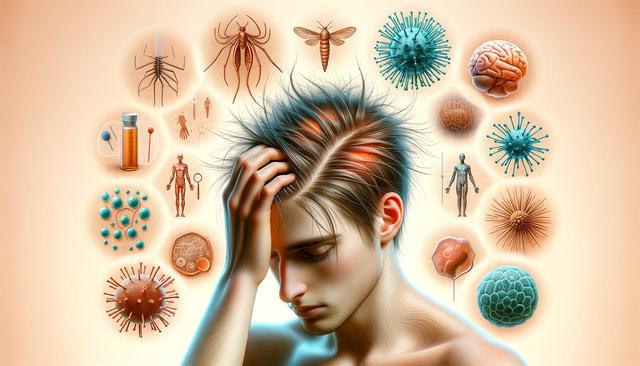Itchy Scalp? Autoimmune Conditions Could Be the Hidden Cause
Persistent scalp itching may be linked to underlying autoimmune conditions such as psoriasis or lupus. Understanding these causes can help you take the right steps toward relief. Learn how medical guidance, gentle care routines, and ongoing symptom monitoring can support scalp health.

Understanding How Autoimmune Diseases Affect the Scalp
Autoimmune diseases occur when the body’s immune system mistakenly attacks its own tissues. When this abnormal immune response targets the skin or scalp, it can result in inflammation, dryness, and persistent itching. The scalp, rich in hair follicles and sebaceous glands, is particularly vulnerable to such immune activity. Several autoimmune conditions are known to trigger scalp symptoms, making early identification crucial for proper management.
Among the most recognized autoimmune-related scalp conditions are:
- Psoriasis: Characterized by red, scaly patches that may itch or bleed, scalp psoriasis is common in individuals with plaque psoriasis.
- Lichen planopilaris: A rare condition leading to inflammation, redness, and permanent hair loss if not addressed early.
- Lupus erythematosus: This systemic condition can cause discoid lesions on the scalp, often resulting in scarring and hair thinning.
Each of these conditions affects the scalp differently, but all share the potential to cause significant discomfort and visible symptoms. If you experience persistent itching, scaling, or hair loss, a dermatologist or rheumatologist can help determine whether an autoimmune disorder is contributing to the issue.
Scalp Psoriasis: A Common Culprit Behind Itching
Scalp psoriasis is one of the more prevalent autoimmune causes of an itchy scalp. It occurs when skin cells multiply too quickly, leading to a buildup of thick, scaly patches. These plaques often appear along the hairline, behind the ears, or across the crown of the head. While not contagious, the flare-ups can be uncomfortable and emotionally distressing.
Symptoms of scalp psoriasis may include:
- Itching or burning sensations
- Silvery-white scales on red patches
- Dry scalp and flaking similar to dandruff
- Temporary hair shedding during a flare-up
Managing scalp psoriasis often involves a combination of topical treatments, medicated shampoos, and lifestyle adjustments. Ingredients such as coal tar and salicylic acid can help reduce scaling, while prescription treatments might include corticosteroids or vitamin D analogs. Keeping the scalp moisturized and avoiding harsh hair products also plays a critical role in controlling symptoms.
Lupus and Its Impact on Scalp Health
Lupus is a chronic autoimmune disease that can affect multiple organs, including the skin. When it affects the scalp, it can cause discoid lesions—round, red, and inflamed patches that may lead to scarring and permanent hair loss. These lesions often appear in sun-exposed areas, and the scalp is no exception.
Scalp symptoms associated with lupus include:
- Itchy, inflamed patches of skin
- Hair thinning or localized bald spots
- Sensitivity to sunlight
- Scarring or discoloration in affected areas
Early medical intervention is essential to minimize damage. Dermatologists often recommend corticosteroid creams or injections, and in more severe cases, oral immunosuppressants may be prescribed. Photoprotection, such as wearing hats or using sunscreen sprays formulated for the scalp, can also help reduce flare-ups triggered by UV exposure.
Other Autoimmune Conditions That Cause Itchy Scalp
Beyond psoriasis and lupus, several other autoimmune disorders can manifest as scalp problems. For example, lichen planopilaris is a form of lichen planus that specifically impacts hair follicles, leading to inflammation, itching, and permanent hair loss. Another condition, dermatomyositis, is a rare inflammatory disease that may cause scalp tenderness and rashes.
Common signs of autoimmune-related scalp issues include:
- Persistent itching unresponsive to over-the-counter products
- Unexplained hair thinning or breakage
- Scalp tenderness or pain
- Noticeable changes in skin texture or coloration
Because these symptoms can overlap with non-autoimmune scalp conditions such as seborrheic dermatitis or eczema, accurate diagnosis is key. A healthcare provider may perform a scalp biopsy or order blood tests to identify autoimmune markers. Keeping a symptom journal can also help track triggers and flare-up patterns.
Managing Scalp Itch with Medical and At-Home Strategies
Managing an autoimmune-related itchy scalp requires a dual approach: medical treatment and gentle self-care. Working closely with a healthcare professional ensures you receive the appropriate diagnosis and targeted therapy. At the same time, adopting scalp-friendly habits can improve comfort and reduce irritation over time.
Effective management strategies include:
- Using dermatologist-recommended shampoos with ingredients like zinc pyrithione or ketoconazole
- Avoiding excessive heat styling or harsh chemical treatments
- Choosing soft-bristle brushes to minimize scalp trauma
- Practicing stress-reduction techniques like mindfulness, which may help lower autoimmune activity
Additionally, regular follow-ups with your healthcare provider can help monitor changes in symptoms and adjust treatment plans as needed. While autoimmune conditions often require long-term management, many individuals experience significant relief with the right combination of medical support and personal care.
Conclusion: Listen to What Your Scalp Is Telling You
If you’ve been dealing with ongoing scalp itching that doesn’t respond to typical remedies, it may be time to consider a deeper cause. Autoimmune conditions like psoriasis, lupus, and lichen planopilaris can significantly affect scalp health, but early diagnosis and consistent care can make a notable difference. By staying informed, seeking professional advice, and adopting scalp-friendly practices, you can take meaningful steps toward managing symptoms and protecting your overall well-being.